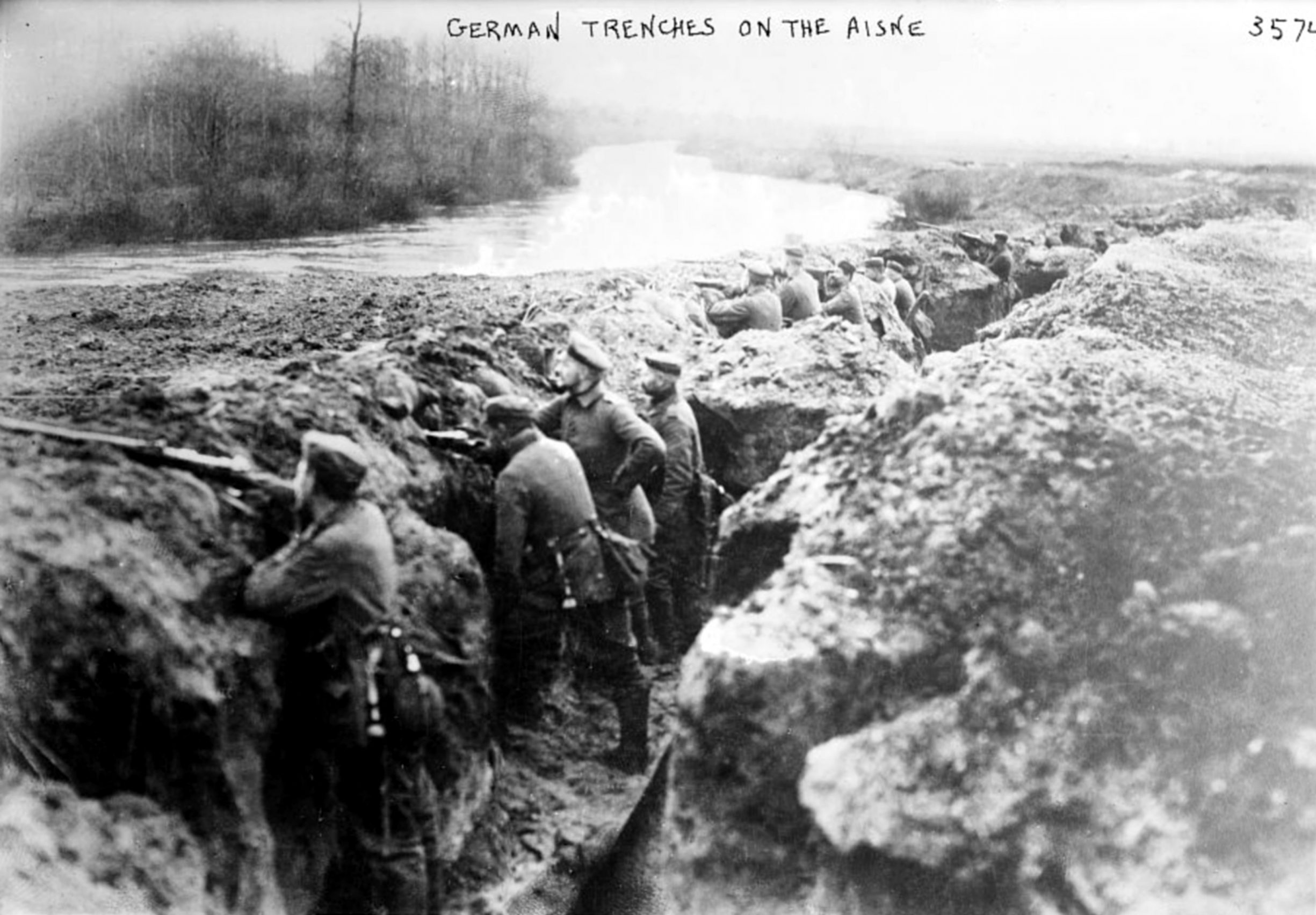
Links til artikler om vigtige begivenheder og datoer under 1. verdenskrig. Links to articles on important events and dates during World War 1.
Indhold
- 1. august 1914
- 4. august 1914
- Julen 1914
- 5.-9. september 1915
- 1. juli 1916
- 6. april 1917
- 11. november 1918
- 28. juni 1919
- Litteratur (generelt WWI)
- Se også
1. august 1914
Første Verdenskrig starter 1. august 1914 med tysk krigserklæring mod Rusland.
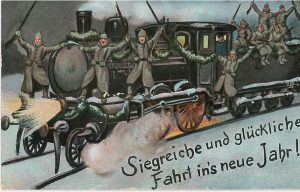
Leksikale artikler mv.:
- Første verdenskrig (Leksikon.org)
- 1. Verdenskrig. Af Nils Arne Sørensen (Denstoredanske). Se også leksikonnets alfabetiske underemner.
- 1. Verdenskrig (Wikipedia.dk).
- World War I (Wikipedia.org).
- No Glory in War, 1914-18 (Noglory.org; online Internet Archive). With Articles, Multimedia and Resources.
- Resistance 100 – Resisting World War 1 (Resistance100.org; online at Internet Archive). “The story of the people and social movements that resisted World War 1.”
- Anden Internationales Fredsmanifest (“Basel-manifestet”). Vedtaget i Basel 25. november 1912. In English: Manifesto of the International Socialist Congress at Basel (Marxists Internet Archive).
- Books, music and films about the Somme (Socialist Worker, Issue 2007, 1 July 2006; online at Internet Archive). “Books, music and films about the battle and the experience of the First World War.”
World War One: All Germany’s fault? (Counterfire, 17 June 2013, 11:37 min.). Neil Faulkner debates Max Hastings: the Jeremy Vine Show (radio-audio).
1914: descent into barbarism. Part 68 in Neil Faulkner: A Marxist History of the World (Counterfire, 26 March 2012) + Part 69: The First World War (2 April 2012) + Part 74: 1918: how the war ended (7 May 2012).
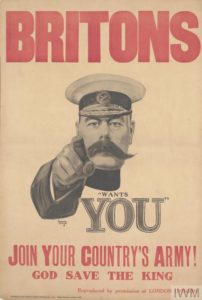
Britons. Join Your Country’s Army!
This is perhaps the most famous poster from the First World War, and shows Field Marshal Lord Kitchener, appealing for people to join the British Army. It was first produced in 1914, but has taken on a more iconic status since the war, when it was not widely circulated outside of the London area. However, its striking visual appeal was picked up by other artists, including in the USA, where the image of Kitchener was replaced by Uncle Sam.
Source: First World War Recruitment Posters (Imperial War Museums, London)
Another from the same IWM online collection:
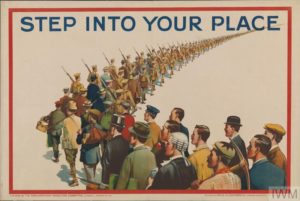
Videos from Marxism 2014:
- Why did the world go to war? By Michael Bradley (YouTube.com, 1:02:14 min.).
- How revolutions ended the war. By Mark L Thomas (YouTube.com, 1:05:36 min.).
- The real legacy of WW1. By Megan Trudell (YouTube.com, 55:08 min.).
- Empire and revolution: A socialist history of the First World War. By Dave Sherry (YouTube.com, 59:51 min.).
Video:
No Glory: The Real History Of World War 1: Presented by ‘Remembering The Real World War 1’ – Bristol’s campaign to commemorate the real World War 1 (YouTube, 1:38:47 hour). Neil Faulkner, etc.
Shorter version: No Glory: The Real History Of World War 1. With Neil Faulkner only. (30:17 min.).
Neil Faulkner: WWI: Imperial carve up, industrialised killing the truth about Gove’s ‘Great War‘ (YouTube, 38:57 min.). Historian Neil Faulkner takes on the revisionist myths about the causes of World War One – part of the Dangerous Times Festival at east London’s RichMix.
YouTube, 5 min. Kirk Douglas in Stanley Kubrick’s “Paths of Glory” (1957)
4. august 1914
En skammens dag i arbejderbevægelsen!
Med de tyske socialdemokraters stemmen for krigsbevillingerne indstiftes “borgfreden” under krigen, garanteres den kommende verdenskrig og socialchauvinismen er født. En skillelinjernes dag i arbejderbevægelsen.
På dansk:
De tyske arbejdere og 1. Verdenskrig. Af Michael Klos. (Arbejderhistorie, nr. 1, 1995, side 22- 34.”Den 1. verdenskrig medførte omfattende samfundsmæssige og politiske ændringer… Revolutionen (nov. 1918) kan dog kun forstås, når man ser på udviklingen af den tyske hjemmefront.”
Kapitalismens verdenskrig og kampen imod den. Af John Riddell (Socialistisk Information, 12. oktober 2014). “I denne artikel forklarer han, hvordan den første verdenskrig brød ud for 100 år siden, hvordan den socialistiske bevægelse reagerede, og hvordan der opstod en revolutionær opposition mod krigen.”
Det tyvende århundredes urkatastrofe. Af Curt Sørensen (Kritisk Debat, 15 august 2014; online på DBC Webarkiv). En revideret og omarbejdet version af dele af kapitel 6 om 1. verdenskrig, i Curt Sørensen: Stat, Nation, Klasse, bind I (Frydenlund, 2013).
Janos Jemnitz: The Danger of War and the Second International (1911). Anmeldelse (pdf) af Hans Fluger (Årbog for arbejderbevægelsens historie, nr. 3, 1973, s.169-173). Scroll ned.
[Samleanmeldelse af bøger om fredsarbejdet og – diskussionen i II. internationale & Zimmerwaldbevægelsen] (pdf). Af Helge Torm (Årbog for arbejderbevægelsens historie, nr. 7, 1977, s.218-224). Scroll ned.Fire Aars Kamp: Socialdemokratisk Ungdomsforbund under Verdenskrigen (pdf). Af Ernst Christiansen og Johs. Erwig (Socialdemokratisk Ungdomsforbund Forlag, 1918, 20 s.; online på Det Kongelige Bibliotek).
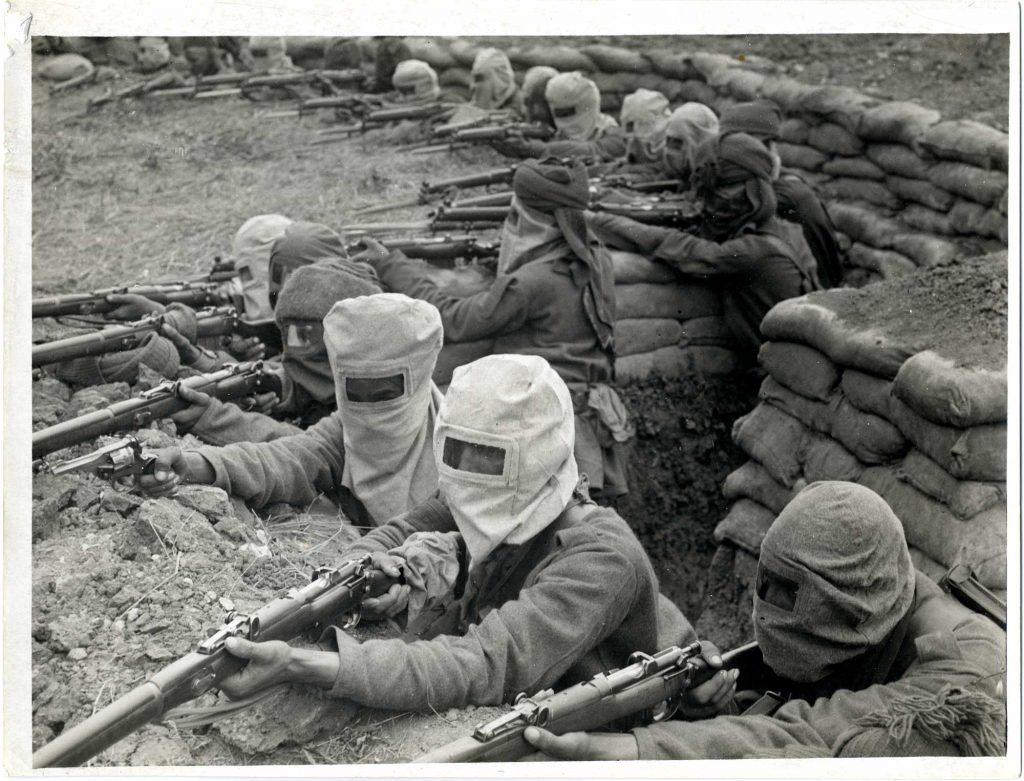
In English:
Comrades at War. By Marcus Barnett and David Broder (Jacobin, 12 November 2018). “Governments want us to respect World War I veterans in an apolitical way. But we should not forget the thousands of veterans who returned home to fight for their rights.”
World War One was stupid, tragic and futile. By Chris Bambery (Counterfire, November 6, 2018). “World War One was a brutal and unnecessary waste of human life and sowed the seeds for the second war.”
The end of “The Great War”. By Allen Ruff (Against the Current, Issue 197, November-December 2018). “At its end, the war left old class-based social and political antagonisms and national grievances unresolved and created massive new ones.”
First World War – a Marxist analysis of the great slaughter (In Defence of Marxism, 1 July 2016). “On the centenary of the battle of the Somme, we are publishing the list of articles [16] written by Alan Woods to examine different aspects of the First World War.”
Understanding the Cataclysm. By Allen Ruff (Against the Current, Issue 183, July-August 2016). Review of Alexander Anievas (ed.), Cataclysm 1914: The First World War and the Making of Modern World Politics (Brill / Haymarket, 2015/2016, 412 p.). “There is no way in a brief review to do justice to all of Cataclysm’s diverse and provocative pieces.”
The battle over the meaning of World War I. By Axel Fair-Schulz (International Socialist Review, Issue 99, Winter 2015-16). Review of Christopher Clark, The Sleepwalkers: How Europe Went to War in 1914 (Harper Perennial, 2014, 736 p.) + Herfried Münkler, Der Große Krieg: Die Welt 1914–1918 (Rowohlt Verlag, 2013, 938 p.). “This review focuses on two major new right-wing revisionist narratives …”
Fatal Fortnight: Arthur Ponsonby and the Fight for British Neutrality in 1914. By Dominic Alexander (CounterFire, July 30, 2015). Review of Duncan Marlor’s book (Frontline Books, 2014, 240 p.). “… shows that Britain’s rulers took the country to war in 1914 through deceit and manipulation.”
Socialists and World War I: Turn the imperialist war into a civil war. By Doug Enaa Greene (Links: International Journal of Socialist Renewal, February 2, 2015). “… missing from all of the observances of the war are the deeper questions of its causes – to divide colonies among predatory ruling classes – and the heroism of those who opposed the mass slaughter.”
Shaping 20th Century America. By Allen Ruff (Against the Current, Issue 174, January-February 2015). About the United States and World War I.
How to think about the Great War. By Dick Howard (Logos: a journal of modern society and culture, Vol.13, No.3-4, 2014). “The historical rupture marked by the Great War of 1914-1918 and its traces throughout the twentieth century have been more controversial in Germany than elsewhere.”
Ten lies told about World War (Counterfire, November 9, 2014). “Dominic Alexander debunks ten myths used to justify the slaughter of the First World War.”
August 1914 and World War I. By William Smaldone (Against the Current, Issue 172, September-October 2014). “Forced to choose between its internationalist principles and the pull of nationalism, the [socialist] movement collapsed …”
World War I and its century. By Allen Ruff (International Viewpoint, Issue 475, August 2014). “In his ‘Age of Extremes’, the great Marxist historian Eric Hobsbawm marked the start of World War I in August, 1914 as the beginning of the ‘short twentieth century’.”
4th August 1914: The great betrayal and collapse of the Second International. By Rob Sewell (In Defence of Marxism, 4 August 2014). “This year marks not only 100 years since the outbreak of the First World War, but it also marks the centenary of another debacle: the collapse of the Second International, the international body that brought under its banner all the mass workers’ parties.”
WW1: A just war or imperial conflict? By John Newsinger (Socialist Review, Issue 393, July-August 2014). “We are told that the Great War was fought to stop German aggression. But the bloody conflict pitted imperial states against each other in a war for colonies.”
One hundred years since the great slaughter. By Tony Saunios (Socialism Today, Issue 180, July-August 2014). “This anniversary has featured prominently in the capitalist media. Most fail, however, to explain why millions of working-class people were sent to their deaths in trench-warfare hellholes: capitalism’s drive for profit, exploitation, raw materials and markets.”
4 August: The great betrayal. By Donny Gluckstein (Socialist Review, Issue 393, July/August 2014). “The decision by mass socialist parties in the Second International to support the war cast a long shadow over the continent.”
The capitulation of the Second International. By Robert Becher (Socialism Today, Issue 180, July-August 2014). “Before 1914, the Second International, grouping together socialist and workers’ organisations throughout Europe, resolved to act to prevent war. Once war had been declared, however, nearly all of these parties backed the capitalists in their own countries.”
August 1914 and the myth of general enthusiasm for war in the German working class. By Verena Nees (World Socialist Web Site, 6 August 2014). “New scholarly publications provide evidence that opposition to the outbreak of the First World War was particularly strong within the working class.”
The changing history of the First World War. By Megan Trudell (International Socialism, Issue 143, Summer 2014, p.61-84). “The anniversary of the First World War has already made clear the extent to which the history of the war is contested.” See also Megan Trudell: The first World War: slaughter and resistance (Irish Marxist Review, Vol.3, No.10, 2014, p.5-12)
World War I and its century. By Allen Ruff (Against the Current, Issue 171, July/August 2014). “If the spark that ignited it all was almost accidental – the assassination at Sarajevo of the Archduke Franz Ferdinand – the root causes of the war clearly went far deeper.”
The great schism: socialism and war in 1914. By Paul Blackledge (International Socialism, Issue 143, Summer 2014). “In what follows I first sketch the limitations of Second International Marxism before outlining the strengths and weaknesses of Lenin’s alternative.”
The shadow of recent wars: Historians and the origins of World War I. By Dominic Alexander (Counterfire, 8 May 2014). Review of Christopher Clarke, The Sleepwalkers: How Europe Went to War in 1914 (Penguin, 2012, 697 p.) + Margaret MacMillan, The War that Ended Peace: How Europe Abandoned Peace for the First World War (Profile Books, 2013, 699 p.)
The shame of imperialism (Weekly Worker, Issue 992, 9 January 2014) + WW I: Necessary and sufficient condition (Issue 993, 16 January 2014). “In this two-part article Chris Gray examines the origins of the war to end all wars.”
Video: The women who fought against WWI: A presentation and group discussion from Katherine Connelly, author of Sylvia Pankhurst: Suffragette, Socialist and Scourge of Empire (Dangerous Times Festival, 2014, 32 min.; online at Counterfire). On Zetkin, Luxemburg and Pankhurst.
To end all wars: How the First World War divided Britain. By Lindsey German (Counterfire, 29 August 2013). Review of Adam Hochschild’s book (Pan, 2013, 356 p.). Se også Ebbe Rand Jørgensen anmeldelse af danske udgave (Aldrig mere krig: loyalitet og modstand 1914-1918 (Informations Forlag, 2014): Krigsmodstanden, der ikke lod sig stoppe (Socialistisk Information, 23. marts 2014).
Was Germany to blame for First World War? By Neil Faulkner (Socialist Worker, Issue 2007, 1 July 2006; online at Internet Archive). “Who caused the First World War? Revisionist historians argue that the war had to be fought because Germany was aggressive and militaristic, a ‘rogue state’ that threatened ‘the balance of power’ and ‘the peace of Europe’.”
World War I: The breakdown of capitalism, Part 1-5 (World Socialist Web Site, 21-26 September 2005). “Lecture delivered by Nick Beams at the Socialist Equality Party/WSWS summer school held August 14 to August 20, 2005 in Ann Arbor, Michigan.”
Prelude to revolution: Class consciousness and the First World War (International Socialism, Issue 76, September 1997, p.67-107). “Megan Trudell explains how and why workers’ and soldiers consciousness became so transformed.”
The First World War. By Ian Birchall (Grimanddim.org). First draft of a chapter from a never-completed book on proletarian internationalism (1996): “The role of the labour leaders was vital in several respects.”
Imperialist war and the question of peace: The peace politics of the Bolsheviks before the November 1917 Revolution. By Roman Rosdolsky (Revolutionary Communist, No.8, July 1978, p.35-43 + No.9, June 1979, p.44-56,; online at Marxists Internet Archive). Svensk udgave: Det imperialistiska kriget och fredsfrågan (Fjärde Internationalen, nr.4, 1980 + nr.1, 1981)
1914: The great schism (pdf). By Marcel Liebman (Socialist Register, 1964, p.283-292). On “… the collapse of socialism in August 1914, of the failure of internationalism, of the dramatic revelation of incapacity hitherto concealed by verbal daring and electoral successes.” Svensk udgave på Marxistarkiv.se: 1914: den stora splittringen (pdf).
Ten years ago and after. By J. T. Murphy (The Communist International, No.5, 1924). “Ten years have gone since the ‘right’ wing of the bourgeoisie swept forward on the tide of imperialism into the first world war.”
‘The national principle’ (1916). By Leon Trotsky (Socialism Today, Issue 184 Dec/Jan 2014/15). “Continuing our series to mark the 100th anniversary of the start of the first world war we are printing an article written by Leon Trotsky, exposing the hypocrisy of world powers towards national minorities and oppressed peoples.”
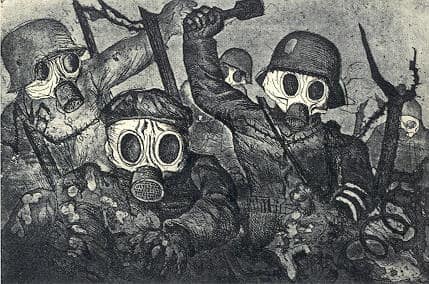
Julen 1914
Under Første Verdenskrigs første jul blev der især på Vestfronten etableret “julefred” mellem de kæmpende skyttegrave, i form af våbenhvile, fraternisering, fællessang og endog forsøg på fodboldkampe.
Se på Socialistisk Bibliotek:
- Emnelisten: Julefreden 1914 / The Christmas Truce
- Emnelisten: Jul – andre sider af julen
See at Socialist Library:
- Link collection: Julefreden 1914 / The Christmas Truce
- Link collection: Christmas – Articles, stories and websites in English
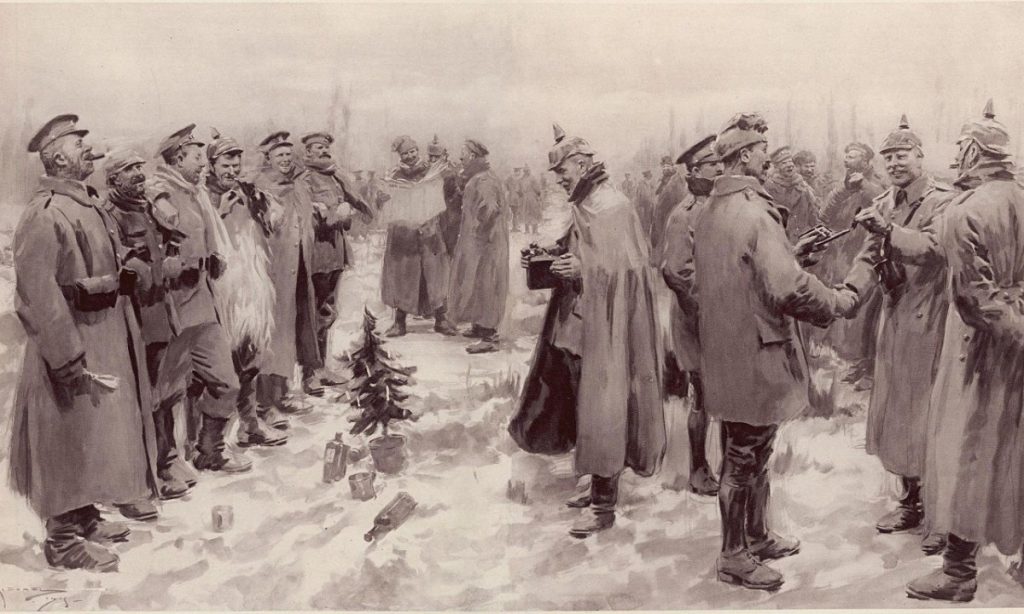
5.-9. september 1915
Antikrigskonferencen for socialdemokrater imod krigen (1. Verdenskrig) slutter i Zimmerwald i Svejts. Konferencen kritiserer Anden Internationale for at have svigtet resolutionerne fra Stuttgart, København og Basel 1912] og for ikke at leve op til sine internationale forpligtigelser. Lenins fraktion på kongressen mener, at krig kun skal bruges til at omstyrte det kapitalistiske samfund. Kongressens manifest ‘Til Europas Proletarer’ trykkes i Fremad, 1915:12.
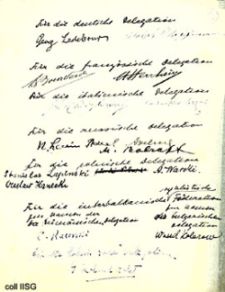
- Zimmerwaldbevægelsen (Leksikon.org).
- Zimmerwald Conference (Wikipedia.org).
Zimmerwald og Kienthal. Af Robert Grimm (Socialdemokratisk Ungdomsforbund, 1918, 36 sider; online på Socialistisk Bibliotek). Pjece med to bilag: Zimmerwald-manifestet: Til Europas Proletarer (1915) og Kienthal-manifestet: Til folkene, som man ruinerer og dræber! (1916). Se også svensk udgave: Zimmerwald och Kiental (pdf) (Frams förlag, Stockholm, 1917, 25 s.; online på Marxistarkiv.se).
Lenin: Den socialistiske revolution og nationernes selvbestemmelsesret (1916) (Marxisme Online). Se note 13.
Kienthal – the small beginnings of the anti-war tradition (Socialist Worker, Issue 2501, 26 April 2016). “In 1916 socialists arguing against war were a minority, but change was coming. Alistair Farrow looks at how it started.”
Zimmerwald 1915: A new socialist resistance against war (Marxist Essays and Commentary, August 21, 2015). Contents: Introduction to the 1915 Zimmerwald Conference, by John Riddell – Letter to the Conference, by Karl Liebknecht – Resolution of the Zimmerwald Left, drafted by Karl Radek – The Zimmerwald Manifesto, drafted by Leon Trotsky.
Zimmerwald 100 år: fra isolation til revolution. Af Marie Frederiksen (Revolution, 20. oktober 2015). “For 100 år siden mødtes en lille gruppe internationalister i den schweiziske by Zimmerwald.”
The Zimmerwald Conference – the turning of the tide. By Alan Woods (In Defence of Marxism, 7 September 2015). “This was the first attempt to unite those socialists who were opposed to the War.”
Marxism & War: Scroll down to On Imperialist War – On Opposition to the First World War (Marxists Internet Archive). With documents, articles and speeches by classical Marxists.
After Zimmerwald. By B. Shepherd (Radical Chains, No.3; online at Libcom.org). “… B. Shepherd shows that the reality was more complex. Lenin may have been well in advance of anyone in his call for revolutionary defeatism, but he failed to break with Second International theoretical orthodoxy and remained isolated on most questions …”
Se også:
The Kiental Manifesto (SocialistWorker.org, April 26, 2016). “John Riddell introduces the manifesto from the follow-up conference to Zimmerwald.”
Fire Aars Kamp: Socialdemokratisk Ungdomsforbund under Verdenskrigen (pdf). Af Ernst Christiansen og Johs. Erwig (Socialdemokratisk Ungdomsforbund Forlag, 1918, 20 s.; online på Det Kongelige Bibliotek).
Series: The struggle against world war (SocialistWorker.org). John Riddell compiles articles and reprints documenting the developing socialist response to the First World War 100 years ago.
1. juli 1916
Det blodige slag i Første Verdenskrig ved Somme begynder, 19.00 dræbte, første dag. Ophører 18. november.
Se:
- Slaget ved Somme (Wikipedia.dk).
The Somme: Remember…and explain (RS21: Revolutionary Socialism in the 21st Century, August 1, 2016). “Ian Birchall reviews Neil Faulkner’s new pamphlet, Have You Forgotten Yet? The Truth about the Somme (No Glory, 2016).
The persistence of the fog of war (Counterfire, July 6, 2016). “Lindsey German makes the connections between recent war remembrance and today’s Chilcot report.”
“Consider us as having died today or tomorrow” (Socialist Review, Issue 415, July-August 2016). “Steve Guy describes the rigid class divisions between officers and rank and file soldiers …”
The Battle of The Somme – The real blood sacrifice. By John Molyneux (Socialist Worker (Ireland), 29 June 2016). “In this year marking the centenary of the Easter Rising there has been a lot of talk about the Rising as a ‘blood sacrifice’. The truth is the real blood sacrifice of 1916 was not the Rising but the Battle of the Somme which began on 1 July and lasted till 18 November.”
Battle of the Somme: the horrific epitome of the first world war. By Lindsey German (Counterfire, 7 January 2014). “Thousands of men who went over the top that morning thought they would meet little resistance. 57,000 were dead or wounded by the end of the day.”
Slaughter at the Somme. By Neil Faulkner (Socialist Worker, Issue 2007, 1 July 2006). “The Battle of the Somme, which took place 90 years ago, reveals the horror of the First World War of 1914-18 and the system that created it.”
6. april 1917
Det tyske socialdemokratis venstrefløj/centrum bryder med partiets krigspolitik og danner USPD.
Se på Socialistisk Bibliotek:
Tidslinjen: 6. april 1917
11. november 1918
11.11. kl. 11: Første Verdenskrig afsluttes med underskrivelse af våbenstilstand i en jernbanevogn i Compiègne-skoven. For Første Verdenskrigs udbrud 4. august 1914, se ovenfor.
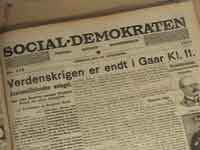
What we should remember on Armistice Day. By Michael Brenes (Jacobin, November 11, 2020). “World War I wasn’t a war for democracy — it was a catastrophic, barbaric conflict that left tens of millions of people dead and set the stage for anti-democratic rollbacks for years to come. Anti-war socialists were right to oppose it.”
The end of “The Great War”. By Allen Ruff (Against the Current, Issue 197, November-December 2018). “At its end, the war left old class-based social and political antagonisms and national grievances unresolved and created massive new ones.”
Armistice day, remembrance and the ‘glorious war’ (Socialist Worker, Issue 2127, 15 November 2008). “Neil Faulkner looks at what the official remembrance ceremonies show about the ideology of our rulers.”
How a workers’ uprising ended the First World War (Socialist Worker, Issue 2128, 22 November 2008). “Volkhard Mosler opens our new series by looking at how revolt spread from the front to the factories in 1918.”
World War I (Marxists Internet Archive). About Russia + Germany.
Expressions of Horror. By Chris Bambery (Socialist Review, No.179, October 1994). “… art exhibition whose work depicts the terror of the First World War and the hope that grew out of it.”
28. juni 1919
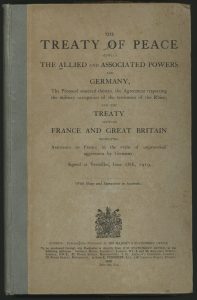
Versailles-traktaten – fredsaftalen om Første Verdenskrig og om betingelserne for Tysklands kapitulation – underskives.
- Versailles-freden (Wikipedia.dk).
- Versaillestraktten 1919 (Denstoredanske).
- Treaty of Versailles (Wikipedia.org). Længere engelsk.
The Treaty of Versailles 1919: a peace pregnant with war. By Dragan Plavšić (Counterfire, June 24, 2019). “The Treaty of Versailles was the continuation of the First World War by other means.”
The Treaty of Versailles – the peace to end all peace. By Alan Woods (In Defence of Marxism, 13 April 2009). “The Versailles Treaty of 1919 was one of the most outrageous and predatory treaties in history. It was a blatant act of plunder perpetrated by a gang of robbers against a helpless, prostrate and bleeding Germany.”
Litteratur:
Verdenskrigen (pdf). Af Georg Brandes (Gyldendals Boghandel/Nordisk Forlag, 1916, 322 sider; online på Internet Archive WayBackMachine).
Tragediens anden del: Fredsslutningen (pdf). Af Georg Brandes (Gyldendal/Nordisk Forlag, 1919, 189 sider; online på Internet Archive WayBackMachine).
Bolsheviks and the World War: The Origins of the Third International (pdf). By Olga Hess Gankin and Harold H. Fisher (Stanford University Press, 1940, 875 pages; online at Drive.google.com) (Hoover Library on War, Revolution, and Peace, publication No.15).
C.L.R. James: “Here is one of the most valuable books published for many years.” (The Bolsheviks at War, New International, No.51, February 1941).
Contents: 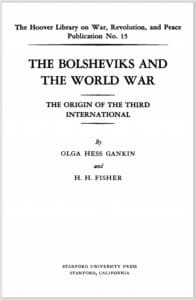
- Chapter I: The Bolsheviks, the Mensheviks, and the Second International (Stuttgart 1907, Copenhagen 1910, Basel 1912.
- Chapter II: The Activities of the Bolsheviks Abroad, 1914-1916
- Chapter III: International Socialist Conferences, September 1914—April 1915 (Lugano and Copenhagen, London and Vienna, Socialist Women and the International Youth at Berne)
- Chapter IV: Zimmerwald
- Chapter V: Kienthal
- Chapter VI: Tactics and Dissensions of the Zimmerwald Left
- Chapter VII: Stockholm: The Third Zimmerwald Conference
- 157 references + Dokuments + Chronology (23 p.) + Bibliography (42 p.) + Biographical Notes (46 p. + General Index (37 p.).
Se også:
Kejserens fald og løftet om revolution. Af Axel Fair-Schulz (Socialistisk Information, 2. december 2018). “Den 9. november markerer 100-året for afsættelsen af Tyskland monark, Wilhelm II. Hans abdikation var kulminationen på en opstand nedefra mod krig og fattigdom, tilsvarende den russiske revolution året før …”
World War I & afterward: upheaval, repression & terror. By Allen Ruff (Against the Current, Issue 191, November-December 2017). “Following the April 1917 U.S. entry into World War I, a massive months-long strike wave occurred …”
The Third Republic, the war and the mutiny in the French Army in 1917. By Steve Guy (International Socialism, Issue 156, Autumn 2017). “From May through to July 2017 over half of the French Army refused to engage in offensive action, refused to needlessly sacrifice themselves in further futile attacks.”
Mutiny at the heart of empire—how soldiers rebelled at Etaples. By Chris Fuller (Socialist Worker, Issue 2571, 9 September 2017, p.14-15). “Ripples of revolution spread across Europe and beyond in the wake of the February revolt in Russia in 1917—and the British Army was no exception.”
Series: The struggle against world war (SocialistWorker.org, July 28, 2014- ). “John Riddell compiles articles and reprints documenting the developing socialist response to the First World War 100 years ago.”
The British Empire and the First World War: the colonial experience. By Talat Ahmed (International Socialism, Issue 152, Autumn 2016, p.117-140). “The colonies were critical to the war effort as a source of both labour and materials.”
Women and the First World War (Socialist Review, Issue 400, March 2015). “The position of women underwent huge change between 1914 and 1918. Jan Nielsen looks at the unintended impact of a war that, for the first time, affected every aspect of economic and social life.”
The mass strike in the First World War. By Chris Fuller (International Socialism, Issue 145, Winter 2015, p.147-168). “… the strengths and weaknesses of Luxemburg’s analysis and prescription for action will be examined.”
Art and the First World War. By John Molyneux (Irish Marxist Review, Vol.3, No.10, 2014, p.20-33). “A very large amount of art, in many different countries, reflected the cataclysm of the First World War but it did so in a wide variety of ways.”
Women in First World War Britain: Exploitation, revolt and betrayal. By Ana Muñoz (In Defence of Marxism, 7 March 2014). “… one aspect which so far has not received sufficient consideration is the role played by women during those dramatic and bloody years.”
Cinema as an imperialist weapon: Hollywood and World War I. By Max Alvarez (World Socialist Web Site, 5 August 2010). “The First World War (1914-1918) marked the initial foray by the US ruling elite into promoting a war with assistance from Hollywood film companies.”
The Bolsheviks and the war. By Peter Taaffe (Socialism Today, Issue 180, July-August 2014). “The horrors of the first world war, and the economic and social turmoil it created, led to mass upheaval. In Russia alone did this lead to a successful revolution.”
Imperialist war and the question of peace: The peace politics of the Bolsheviks before the November 1917 Revolution. By Roman Rosdolsky (Revolutionary Communist, No.8, July 1978, p.35-43 + No.9, June 1979, p.44-56; online at Marxists Internet Archive). Svensk udgave: Det imperialistiska kriget och fredsfrågan (Fjärde Internationalen, nr.4, 1980 + nr.1, 1981).
The myth of Lenin’s ‘Revolutionary Defeatism’. By Hal Draper (New International, 1953-1954; online at Marxists Internet Archive). “At a certain time after Lenin’s death, and for reasons which we shall see, this ‘defeatism’ became a fixed part of the Lenin-canon; to question it was to question a ‘fundamental principle’ of Leninism. That it is any principle at all is part of a myth.”
Se også på Socialistisk Bibliotek:
Linkboxen: Den tyske revolution 1918-23. Links til danske og engelske artikler om de tyske revolutionsforsøg fra afslutningen af Første Verdenskrig i 1918 til 1923.
Emnelisten: Anden Verdenskrig, 1939-1945
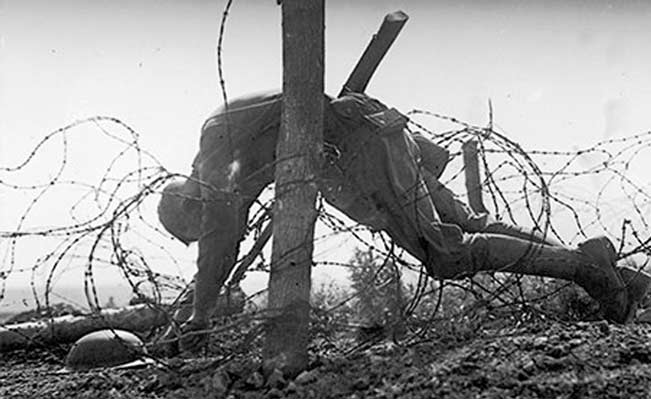
















![A demonstration of workers from the Putilov plant in Petrograd (modern day St. Peterburg), Russia, during the February Revolution. The left banner reads (misspelt) "Feed [plural imperative] the children of the defenders of the motherland"; the right banner, "Increase payments to the soldiers' families - defenders of freedom and world peace". Both refer to the economic toll the First World War was having on civilian life, February 1917 (probably around March 7 [O.S. February 22]) Photo: Unknown. Public Domain.](https://socbib.dk/wp-content/uploads/2007/04/1917-februarrevolution2.1500x0-218x150.jpg)

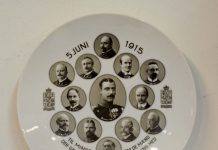
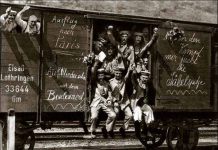

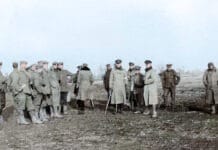











![A demonstration of workers from the Putilov plant in Petrograd (modern day St. Peterburg), Russia, during the February Revolution. The left banner reads (misspelt) "Feed [plural imperative] the children of the defenders of the motherland"; the right banner, "Increase payments to the soldiers' families - defenders of freedom and world peace". Both refer to the economic toll the First World War was having on civilian life, February 1917 (probably around March 7 [O.S. February 22]) Photo: Unknown. Public Domain.](https://socbib.dk/wp-content/uploads/2007/04/1917-februarrevolution2.1500x0-100x70.jpg)